Religion
Nothing has shown more fully the prodigious ignorance of human ideas and their littleness, than the discovery of [Sir William] Herschell, that what used to be called the Milky Way is a portion of perhaps an infinite multitude of worlds![60]
Humans have practiced some form of religion from our earliest existence as a distinct species. Our cousins the Neanderthal people may have too but our nearest living cousins, chimpanzees do not.
Thus religion is probably less than 200 thousand years old and is associated with the way we humans think about our environment; how we deal with the unknown; and the scary.
View an interesting academic discussion of these origins and interactions: Science, Magic and Religion
We all learn about religion as infants. Most of us will go on to hold to the religion we were taught by our primary carer, usually our mother, our father and maybe a grandmother or nurse, when we learnt our first language. Like our language it is a cultural artefact - possessing no absolute truth.
Many societies thrive and prosper with entirely different, often contradictory, religions - just as there are many different functioning languages.
There were no Christians or Muslims in Plato's Athens. Totally different religious beliefs were just as firmly held and taught to their children by the women of polytheistic ancient Athens. Yet Athens gave us democracy and the foundations of mathematics, systematic rational thought and ethical analysis.
In another way religion can be seen as simply a subset of the social and cultural interactions that we more generally call politics.
Politics is, in turn, the widening of one-to-one interactions we had as a child. For example, our relationship with a sibling might be widened by drawing-in a parent in family politics: 'we want to go to the beach'; or 'Lachlan's taken my pencil'.
We would not want to ascribe anything mystical to politics; particularly to those of political parties. Politics is obviously the process and outcome of human interactions. It is an emergent quality that arises out of human interactions between two or more people; in the same way that a tune arises out of two or more notes; a concept out of a collection of words; or intelligence out of a collection of neurons.
Organised religion is closely associated with politics. Organised religion is essentially the application of politics to primitive mysticism; awe; and fear of the unknown.
In the Beginning
Most 'primitive' religions are about our relationship with nature; the environment; other animals; and the climate. These religions tend to have many gods (are polytheistic) or many spirits.
A modern variation on this is pantheism; in which nature itself and humankind, particularly on Earth, is seen as a single organism and maybe identified with God or a 'universal spirit'. This can be seen in the extreme green or 'deep green' movement of today.
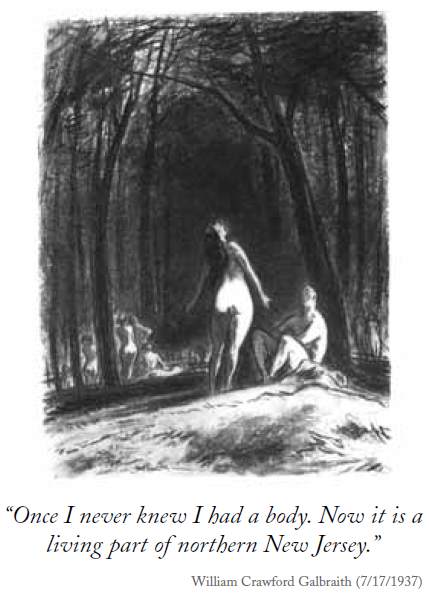
Prior to settlements and civilisation humans were nomadic herders of hunters and gatherers. Religions were animistic and attributed magical properties and/or souls to animals, plants and places. Such beliefs persist in subsistence communities to this day.
But as settlements grew into towns then cities these beliefs began to be merged with the rules necessary for people to live together; politics. Settlements and towns are based on agriculture and with it the seasons assume increased importance. Tracking and forecasting the seasons requires a calendar of some sort usually based on astronomy; the movement of the stars or positions of the rising or setting of the sun and phases of the moon. These astronomical cycles become linked to the flowering of plants; to flooding of rivers; to the first snow and so on.
A causal relationship may then be assumed. Things in the heavens seem to be causing events on Earth. Whereas today we would want to say that the story is much more subtle: the seasons are caused by the Earth's attitude and orbit in respect of the Sun; but the Moon also has an affect on the tides and continental drift. Only occasionally do events outside the solar system like supernova or the close passing of other stars have an impact; unless, perhaps, solar storms are induced by external factors.
The repetitive cycle of seasons and of birth and death suggests a never ending universe, in which souls are associated with a life force; and pass to a creature as it comes to life then to another when that creature dies.
In almost all ancient religions a priesthood of people skilled in the prediction of the seasons gained increasing importance. In most early religions the priesthood also developed rituals for the transition of souls from the dead to the living; or to another world.
Soon the animistic spirits of nomadic humans become the gods of settled communities and heavenly events become associated with important terrestrial events or activities. All early religions in settled communities have multiple gods; each responsible for particular classes of event and in many cases lending exclusive support to a particular population, city or town. These gods are generally given the power to move between realms and often in and out of material objects; in ancient Greece and Rome heroes could become gods.
But occasionally this idyllic wheel of life (Great Mandala) is disrupted by cataclysmic events: a terrible storm; fire; flood; pestilence; or plague. Climate variation might result in a series of poor seasons; or the area may be subject to earthquakes; tsunami; or a volcano. Agriculture requires making provision for the future. Ground must be prepared; water supplied; seed sewn; and seed must be set aside for the next season and perhaps more. Food must be stored. Failing to set aside enough will lead to disaster. In all such communities the practice of making offerings to nature; and then to a variety of gods arose. This happened quite independently across settled human communities; so that sacrifice is an almost universal theme of all world religions.
In an attempt to pacify the gods, who were accredited with imposing these hardships, almost all organised religions passed through a phase of increasingly extreme sacrifice, escalating from: foodstuffs; to prized animals; to firstborn children; and sometimes virgin girls. As it eventually became evident that cataclysmic events continued notwithstanding. Most then progressively softened these practices; quite often by making captured enemies proxy for the sacrifice; and then by making the sacrifice entirely symbolic. Now, for example, Christians are saved from sin by the death of Christ as proxy; and by the regular (symbolic or transubstantiated) consumption of his body and blood. But in South America, we were told, human sacrifice is still practiced in some areas; with a similar goals (mortal and immortal).
Present religions are a few thousand years old or less. Some like Islam and Christianity can clearly be seen to have evolved from Judaism (with a bit of Greco-Roman thrown in) that in turn evolved from earlier cults. But those of us with Northern European ancestry got on perfectly well with a succession of pre-Christian religions that allowed our ancestors to prevail over all sorts of 'heretics' (those with differing beliefs who failed to thrive) for tens of thousands of years.

Even the briefest acquaintance with archaeology or anthropology, let alone comparative religion, exposes the evolutionary and sometimes revolutionary nature of religious belief. That these are human ideas developed and given credibility by men (and women) is immediately exposed.
Monotheism
Monotheism is an interesting departure from more common polytheism. Unlike these religions it has an immediately obvious problem in explaining the existence of evil; or alternatively an apparent lack of concern for human wellbeing. So in some formulations it posits an anti-god or devil; and in others it allows other heavenly beings who can intercede; and is thus actually polytheistic.
The three principal monotheistic religions each trace their history back to Abraham, a nomadic chieftain of around 2000 BCE. He is said the have left Ur and settled in Canaan (Israel) in the Middle East. Archaeologists have found evidence of several such migrations; one of which is associated with Abraham and has been dated to 1850 BCE. But it seems that this was not yet true monotheism - other gods Baal and Yam were still accounted real; but those of other tribes. Abraham's god; a version of El (the Canaanite High God) was the one god to be exclusively recognised by his tribe; on pain of death. This was a god who took human form and liked to drop in to Abraham's tent for a chat.
As a result of a severe famine the Canaanites then emigrated to Egypt where in 1346 BCE the sun god: Aten became the only god worshiped. This was short lived with the other gods being restored upon the death of Pharaoh Akhenaten 1334 BCE.
Some elements of the Bible can be traced to Egyptian sources - in particular the earliest Psalms. For example Psalm 104 paraphrases The Great Hymn to the Aten, found in the tomb of Ay and is attributed to Akhenaten:

Part of the actual hymn - source
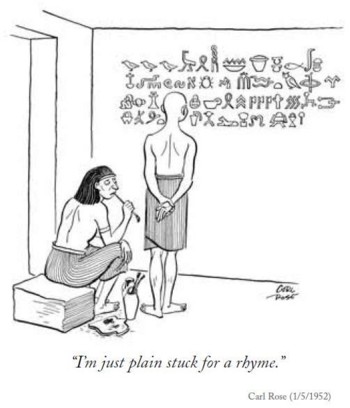
According to the Bible several generations of the tribe passed in slavery in Egypt until around 1300 BCE when they were liberated by the Egyptian Prince: Moses. Various scholars have suggested that Moses fled Egypt with his followers as a result of the restoration of polytheism. But the best records from the period are Egyptian and they contain no mention of Moses or the associated events; except a mention of roaming bands of warlike Hebrew.
It was important to the subsequent return to Canaan that Moses could be shown to be in the paternal line from Abraham; just as two early Gospels establish the paternal line of Jesus back to Abraham via Solomon and David. The Bible therefore contains the improbable, and completely unsubstantiated, story of him entering the Egyptian court as a foundling.
It was Moses who elevated the god of Abraham to Yahweh; the incorporeal God of the subsequent monotheistic religions; and who is accredited with initial authorship of the Bible.
Politically, monotheism has been successful in civilisations where the supreme ruler or sovereign takes authority from a supreme God; in the case of early Christianity; having been anointed by a bishop of the Church.
The Problem of Scale
Religion is very human. Our brain is a very inadequate instrument for understanding the universe.
This essay is about meaning and possibly the purpose in life. But life has a universal reality that is quite independent of humanity. We are brief observers of 'life'. The entire duration of humanity has been, and will be, an infinitesimal flash of time in the great lifetime of this universe. Life has been here from very early on, and very likely, will continue 'til near the end of time.
If you doubt this, look up at the night sky where you will see the stars in our galaxy: the Milky Way. The Milky Way contains about 100,000,000,000 stars, give or take a few billion, of which our sun is one. This is more than the grains of sand on every beach in the world. As telescopes have become more powerful, Astronomers have seen more and more galaxies. They presently estimate that there are more galaxies than there are stars in our galaxy (the Milky Way)[61].
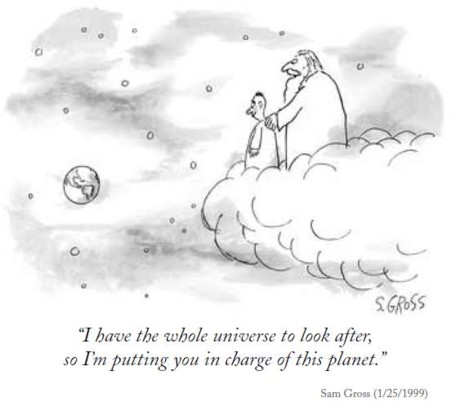
Light and other radiation reaching us from stars shows that the Universe is very large; and very old. Because we know the speed of light; how frequency shifts depending on the speed an object is travelling (that is how the police catch speeding cars with radar); and the frequency at which the light was originally generated (by electrons jumping between energy states - called atomic spectra); the speed and distance of a star can be calculated.
The light reaching us from the furthest away is thousands of millions of years old. We can also estimate the age of the Universe from the cosmic background radiation. The present best estimate for the age of our Universe (from the WMA Probe[62] in 2003) is 13.7 thousand million years. What has happened in those parts of the universe since? In this part of the universe, life and intelligence has evolved in that time.
Let us suppose that the evolution of intelligence has taken a similar time elsewhere where the environment is similar, for example on rocky planets orbiting similar stars at a similar distance (30,000 light years) from the galactic centre. There might be several within a few thousand light years.
By mid 2007, 236 planets had been discovered orbiting nearby stars. New planets around other suns are now being discovered daily and one of the successors to the Hubble Space telescope, the Kepler Space Telescope, is specifically designed to find rocky earth like planets amongst them. [2012 update: now over 700 exoplanets have been found in 672 planetary systems; of which 7 may be habitable]
As we have been incapable of sending a message beyond this planet until about a hundred years ago (less than a two thousandth of our 'intelligent' presence), there may be many inhabited planets with developing cultures similar to those of Neanderthal Europe, Stone Age Australia or ancient Judea, with beliefs and societies that are presently anathema to the development of their version of science, a deeper understanding of the universe (necessary for the development of communications technology).
There may be many life-forms that have surpassed us but their messages are still several thousand years from reaching us. Such cultures will be completely invisible to us in present circumstances.
If this is so there may be tens of thousands of intelligent species in our Galaxy. And ours is but one of over a hundred billion galaxies in the Universe.
If 'life' has a 'meaning' it need not involve humanity, any more than it involves dodos.
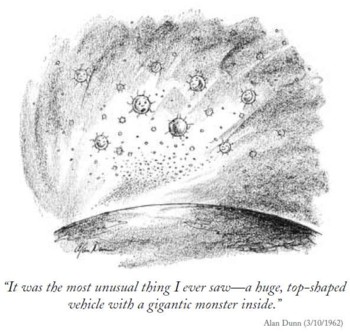
While the existence of this Universe could denote a Creator; the idea that this same Creator requires the unique presence of humans to praise Him; or that His creation was intended to culminate in Man is reduced to absurdity.
It would be ridiculous in this tiny part of the universe for us to claim that we do or can ever understand everything or even a fraction of everything. Even if we did this to our satisfaction, it is unlikely that a differently structured intelligence would be satisfied.
Until we understand everything we cannot know that there is no God, until God is revealed we cannot know that there is a God:
There are more things in heaven and earth, Horatio,
Than are dreamt of in your philosophy.[63]
Human ideas have now evolved to the point where our brightest minds cannot be certain about anything. Doubt about what we can know is common to all major strands of western philosophy and is also evident in the major (thinking) religions.
Our Religious Heritage
The religion of our culture is Christianity and, more distantly, its related cousins: Judaism and Islam. Just as we would not been here if every one of the tyrants and saints that went before, had not been; so our present shared ideas would have been different with a different religion. Those who want to understand our culture must understand the religion that goes behind it and once dominated it; out of which it grew.
For example, scholars of comparative religion point out that Christianity is one of the few religions that hold that the future can improve on the past. It sees existence as a progression to a better future whereas most religions argue that the world is unchangeable, subject to the whims of the gods or cyclical. Thus Christianity may have been the only available 'jumping off point' to a modern secular humanist position. And it was certainly the protestant reformation that created such doubt as to admit the possibility of atheism.
Religion still supports some of our wisest people and amongst these it is possible to find some of the most interesting we can meet. Whatever our personal views, we should remember that it was Christianity that set the starting point for most of our most fundamental ideas about what it is to be human, what is real and what we can know.
To be a Christian, in the traditional sense, a person should believe the Apostles' Creed, including that:
- The heavens and the earth were made in six days and on the seventh God rested.
- God, the maker of heaven and earth, sacrificed his only human son (born of the Virgin) to die on the Cross, to mitigate each believer's (original and recently committed) sins.
- Three days after his death Jesus rose from the dead to form part of a Trinity in Heaven with God the Father and the Holy Spirit (unless the believer is a Unitarian – then there is but one God and no Trinity).
- Babies are born in original sin but can be protected by baptism and if people believe in the forgiveness of Christ (and variously in the additional teachings of one of several Christian sects) they will be forgiven their sins and live in Heaven (after this life; without their body) for evermore.
- Those who hear this message but don't believe it will have their everlasting soul damned forever.
This is a very brief outline of the basic beliefs and has none of the subtlety, drama or passion of a system of thought that occupied our brightest minds for nearly two thousand years. If you had been born a thousand years ago (or a week ago in some places) you would believe all this unreservedly but today many 'Christians' recite the Apostles' Creed but do not believe it literally and/or without doubt.
Even in a monotheistic religion like Christianity some believe in powerful but lesser god-like identities 'thou shall have no other gods than Me' (which are they?), The Virgin, Saints, Angels, The Devil etc. Others would say that most of these identities have no support in scripture and holding to them (like holding to more than two sacraments; Communion and Baptism) is heretical.
This issue of heresy has caused the suffering, death and sometimes torture of countless believers and/or their victims over the past 2000 years.
It has been said that religious faith is the corollary of doubt (some say antidote to doubt). My experience is that the most profound religious thinkers are often fighting off doubt.
Of course it is still possible to bring up a child so that they will experience no doubt but to do this you have to prevent them being exposed to contradictory ideas. Religions often try to censor ideas for this reason.
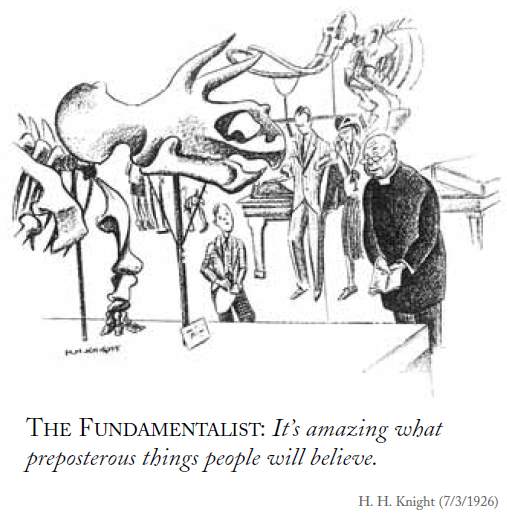
People sometimes ask, 'What is the purpose of religion'? Of course you might equally ask, 'What was the purpose of Hitler'? The answer may be that religion 'just is' it evolved in the minds of people like butterflies or snakes did in nature. Biologists have argued that religion enhances reproductive success by imposing rules on its adherents that limit promiscuity and favour child rearing.
A common argument for religious belief is the apparent occurrence of miracles. Miracles have been the source of a great deal of debate and dissent amongst theologians but remain a component of sanctification in the Catholic Church to this day. You can do no better that read David Hume's essay on this topic for a philosophical introduction. Miracles must be metaphysical or paranormal events as if they are not they are normal physical events and subject to and caused by natural laws. The difficulty is that no one has ever satisfactorily isolated such an event.
Modern miracles fall into three broad categories: visions; cures and unlikely events.
We are unable to know what another actually perceives. I do know that your green may be my red; your sour my tasteless; your perfumed my odourless; but I can't be absolutely sure that you are not a figment of my imagination. As a result no one is qualified to fully judge someone else's perception of reality. But I find myself generally sceptical of the reported perceptions of someone who claims to see the world significantly differently to the way I see it unless I can replicate their experience. Otherwise I might suspect they are deluded, psychotic or hallucinating. And so it is with visions.
While faith healers can apparently 'cure' diseases that are susceptible to the placebo effect, may be psychosomatic or may be subject to natural recovery, remission or strengthening they have never successfully caused the regrowth of a severed limb; even though a number of nonhuman animals are able to regrow limbs.
As soon as the 'cure' has a rational explanation it ceases to be a miracle. And we know that if present stem-cell research makes lost limbs grow back, the very people who lined up against the research will be lining up to pray for new limbs for their victims.
In the third category are the: "everyone but me was drowned but I was saved by these extraordinarily unlikely circumstances"; or "I was in a terrible accident but against the odds survived"; type experiences.
If a gardener wants to rid a pot plant of an ant's nest, she takes a bucket of water and submerges the pot. Almost all the ants drown but a few will always get the surface alive. Perhaps they are trapped in a bubble or cling to a little floating thing. If there are many she might use fly spray too. A few usually manage to climb out of the bucket but thousands are killed. If they were human, the survivors might fall to their knees and praise her for saving them. Just such praise is offered to any convenient god after every tsunami, earthquake or hurricane, not that such events are similarly deliberate.
If only Christians; Jews; Janes; Hindus; believers in Zeus; or any one of the hundreds of other human gods; invariably survived disasters while others invariably perished it would indeed be evidence of divine intervention. But it would still not be a miracle, as then it would be a simple fact of nature: 'follow Woden and you will survive disasters'[64].
Most religions contain both a powerful but un-testable promise and a threat (like reward or punishment in the next world). Some have argued that religion is positively harmful in this world. According to Karl Marx 'religion is the opium of the people'. Richard Dawkins has likened religion to a virus in the mind. Woody Allen says that considering all the suffering in the world, the best that can be said about God is that He is an under-achiever.
Wars, conflicts and terrorism often have a religious motivation and religion is seldom a force for peace, co-operation or compromise between nations:
Only one more indispensable massacre of Communists or Capitalists or Christians or Heretics, and there we are – there we are in the Golden Future.[65]
Religions often support existing class and social structures and resist change or the more equitable distribution of wealth. Until Vatican 2, the Roman Catholic Church still supported monarchies over democracies and actively rejected modernism.
Christianity claims to be a religion of peace but of course it would not have survived if it had always 'turned the other cheek' in the face of other religions. The very claim that it is a religion of peace is to be implicitly critical of (and an act of aggression against) other religions. When we talked of peace on earth and good will to all men; traditionally this meant a 'Christian peace' and 'all men who will accept our way of thinking'.
Christianity has been one of the world's most successful religions. To survive it had to proclaim some special position or truth not possessed by other religions. It had to have some special ability to capture the hearts and minds of people to make them fight for its survival and its spread.
In part it has done this by absorbing powerful ideas from other religions (like Saints, Christmas, Easter, angels, the apocalypse, devils and demons) and in part its internal conflicts created the chaotic and rich intellectual environment in which scientific thought could evolve.
Ethics
It used to be thought that religion was the source of our ethical standards. Now we believe that it is our culture that embodies our ethics, just as it creates and supports our religious beliefs. For example, the profoundly humanist instruction to 'Do unto others as you would have them do unto you' was not original to Jesus but can be found widely in earlier non-Christian cultures. Jesus was a disciple of John the Baptist and a long tradition of Jewish thinking along these lines.
The now widely held beliefs that: 'all people are created equal' or that society's goals should be to secure each individual's rights to: 'Life, Liberty and the pursuit of Happiness' are Humanist/ Utilitarian values not Christian ones. They came to Christianity (and the US Declaration of Independence) through the Unitarianism of Franklin and Jefferson (at least); Unitarianism is the belief in a singular God, as originator, and a denial of the Trinity or the divinity of Christ. It is 'enlightened' and strongly secular in its moral outlook.
Several of our strongest held moral taboos are not mentioned as crimes in the Bible, paedophilia (sexual attraction to children) for example. Others, that are mentioned (like homosexuality), are no longer regarded as crimes. The Bible is racist and regards slaves like 'parts of the furniture'.
Most moral standards are social rules that have been found to work. Often religions pick them up and give them the authority of God's word but just as often religions endorse rules that are more sinister. These are rules that are intended to protect the powerful or entrench social position or convention. Examples include those making women subservient to men or establishing social casts.
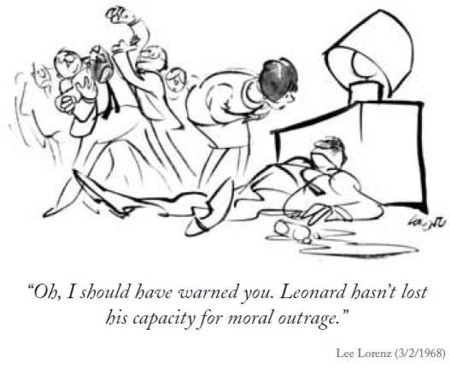
International covenants on human rights specifically exclude appeals to a deity (God) for establishing their values but find it necessary to protect against religious, intolerance, persecution and discrimination. One of the few human rights guaranteed by the Australian Constitution prohibits the establishment of any religion the freedom from religious test or enforced religious observance[66].
You can test the moral value of religion by considering the religious beliefs of very bad people and of those who contribute to a better world. In my life I have found very little connection between how good a person is and their religious beliefs (one way or the other). If we don't need religion to establish our moral framework, maybe we need it to answer the big questions of life?
Purpose
When people ask, 'what is the meaning of life?' they may be asking a religious question. They are not asking the meaning of the word 'life'. Nor are they asking what it is to be alive. Nor are they asking the 'purpose' of life in the normal sense. A doctor or a policeman or a priest has a list of purposes or functions (like a computer or a fry pan). But if you answered that the purpose of life was to be a doctor or a policeman or a priest, it is probable that they would not be satisfied.
The word 'purpose' seems to imply some owner or creator that is not just an employer or a parent. The question seems to anticipate an answer with God in it like: 'what did God put us here to do' or 'is there a divine plan or pattern to my existence'?
These questions seem to have meaning because we understand the words in a day-to-day context. We can make something useful or employ someone to do something for us. But to work in a metaphysical context they must first assume that God or some other planning agent exists and that He has made us for a reason. These questions are meaningless if God or another architect does not exist and so they shed no light on His existence.
But why would the creator of the infinite Universe need our help? Why are we so insignificant in that universe in size and in time? And if we are fulfilling His purpose, why is it so mysterious?
Some believers are determined to make the Bible version of creation agree with the scientific evidence. To do this they say that the word 'day' just needs to be redefined. But if God created the universe in six days: then a day lasts around two thousand million years; primitive life appeared a couple of days ago; the dinosaurs died out about an hour ago; humans appeared about 10 seconds ago; and His Bible was written less than a tenth of a second ago. If He then rested for a day, we still have a long time to wait for His return.
Some argue everything must have a creator so the universe must have a creator (and that is God). In that case who or what created God? If something doesn't need a creator, why does the universe need a creator?
Elizabeth Ann
Said to her Nan:
'Please will you tell me how God began?
Somebody must have made Him. So
Who could it be, 'cos I want to know?'
And Nurse said, 'Well!'
And Ann said, 'Well?
I know you know, and I wish you'd tell.'
And Nurse took the pins from her mouth and said,
'Now then, darling, it's time for bed.'[67]
Using empiricism, questions of this sort are scientifically meaningless because they can't be tested. Yet we do find evidence of order in the universe. That is what science is about. And if we choose, we can call this ordering principle: God. We were certainly created by the workings of 'the laws of nature'. But this God is at one with the universe, so when we look at anything we are looking at God. This is another way of saying that as far as we can tell, God doesn't do anything unusual; like intervene on our behalf or interfere in our lives in an unnatural way.
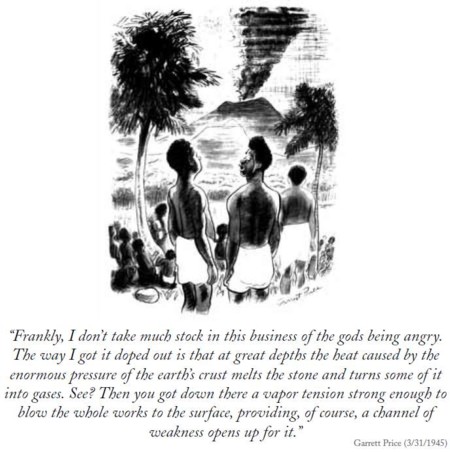
The main use for statements or questions about God, that can't be tested by science (like: God loves me), is cultural, to give us insights to the way that people think and feel about things, not to tell us anything special about existence.
Religions often separate mind from body. The idea that the soul can live on, after bodily death, is very widespread in all human cultures. It is probable that every animal has some sense of self. The thinking process that decides to stalk prey, or run and hide from danger, probably seems much as it does to us; a thinking 'Me' that is telling my body what to do. But we know that this is entirely the result of message processing in a machine (the animal brain). The separation is an illusion.
That this separation could continue after the brain is 'turned off' is an idea takes many forms and as far as we can tell, is held by humans alone. Our culture inherited it from the Greeks and Egyptians into the Bible. The Old Testament is ambiguous on the subject but the New Testament is not. This separation between body and soul, allows the soul to exist independently or move between one body and another, to go around endlessly between bodies or universes or even skip into animals rock or plants. So when our body dies our soul might live on.
The 'life after death idea' has always been attractive to wealthy and privileged people. The Egyptian Pharaohs and Chinese and Roman Emperors made elaborate arrangements for the afterlife. Will Bill Gates, Rupert Murdoch, the Queen and the Pope just cease to be when their body dies? Wouldn't it be nice if they could go on enjoying their worldly advantages after death?
We can understand why the wealthy and privileged might be attracted to the 'life after death idea' but they are hugely outnumbered by the poor and suffering. In the New Testament the poor and under-privileged in this life are favoured in the afterlife:
Again I tell you, it is easier for a rope (Camel) to go through the eye of a needle than for a rich man to enter the Kingdom of God[68]
One of the great attractions of Christianity is that it offers the poor hope for a better life in the (sweet) hereafter. At the final reckoning the tables (with their bosses and oppressors) will be evened up. But the Old Testament Bible says that the belief in an afterlife or that our achievements are lasting is vanity (see the first quotation in this essay).
The idea that a person can survive death has probably been the cause of more human suffering than any other in history. It is the progenitor of a wide family of unsupportable related concepts (heaven, hell, reincarnation and so on) that cause people to live their present lives in expectation of a future chimera; to martyr themselves in religious causes; to fear the dark and unseen forces; to oppose humane and loving outcomes for the living and the dying in preference to drawn out misery or the not yet born; to misdirect economic activity in the direction of useless edifices and even to murder others to accompany them to the hereafter; to attribute special provenance to the rich or powerful; and to engage in pointless disputation, schism, wars and hatred.
As our culture has evolved and our thinking has changed, it is difficult now to believe that culturally fabricated religious stories, that were once believed absolutely, are anything but cultural parables. The German thinker, Friedrich Nietzsche is famous for proclaiming, 'God is dead'.


